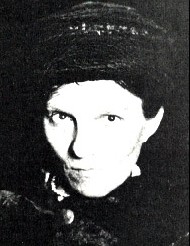M`a`r`t`h`a` `W`i`s`e` (Martha Wise)

Martha Wise was born in 1884 to Sophie Hasel and her husband, farmers in Hardscrabble, a town in Medina County, Ohio. Three brothers and a sister were also born to the family, although contemporary sources name only one, a brother named Fred. In 1906, Martha Hasel met the substantially older Albert Wise at a box social; the two were married, though Wise neglected to give her a wedding ring. The marriage was not happy. Martha moved onto Albert’s 50-acre (20 ha) farm, but quickly discovered that he expected a farmhand more than a wife, and life was no less poor as a married woman than it had been when she lived with her parents. Even when pregnant, she was forced to do farm work that was generally male-oriented (such as plowing fields and slopping hogs) as well as the usual household chores of baking and cleaning. The couple’s first child, Albert, did not survive infancy; four others, Everett, Gertrude, Kenneth, and Lester, did. Martha Wise’s main source of diversion during this period was funerals; she seldom missed a visit to any funeral held in or near the town, whether she had known the deceased or not. When questioned, she simply said that she liked funerals. Albert Wise died suddenly in 1923, leaving his wife a 40-year-old widow with four children. Her odd behavior and fixation on funerals became more noticeable, and she began not only attending funerals, but openly crying and lamenting at them, no matter who had died.
Within a year of Albert Wise’s death, Martha Wise, though not considered a particularly good or attractive catch, found new male companionship in the form of Walter Johns, who worked as a farmhand on property adjacent to her farm. The relationship was frowned upon by Wise’s family, and both Wise’s mother, Sophie Hasel, and her aunt, Lily Gienke, made no secret of their desire for Wise to end the relationship. By the end of 1924, Wise had acquiesced, and the relationship ended. Johns moved to Cleveland and the couple lost contact. On Thanksgiving evening, 1924, several members of the family, including Sophie Hasel, fell ill with a severe stomach ailment. The others recovered shortly, but Hasel’s illness worsened, and she died on December 13, 1924. New Year’s Eve of 1925 brought more illness. Wise’s uncle Fred Gienke, his wife, Lily, and several of their children all began suffering stomach pains similar to those Hasel had experienced before her death. Several family members were hospitalized, and Lily and Fred were both dead by February 1925. In total, seventeen relatives were taken ill with similar symptoms in the fall and winter of 1924/1925. Four of the Gienke children were left partially paralyzed from the mysterious illness.
After the deaths of the Gienkes, authorities began to investigate the cluster of deaths.[note 2] The county sheriff, Fred Roshon, soon discovered that Martha Wise had signed at a local drug store for a series of purchases of large quantities of arsenic. An autopsy on Lily Gienke confirmed the presence of arsenic in her digestive tract. Brought in for questioning by the sheriff, Wise at first claimed she had obtained the arsenic to kill rats, but eventually confessed that she had used it to poison family members by putting it in water buckets and coffee pots the family drank out of. Despite her confession, Martha Wise pleaded not guilty to the charge of murdering Lily Gienke in front of a grand jury on March 23, 1925. She told the grand jury that she was irresistibly attracted to attending funerals, and that when there were not enough funerals in the community, she was driven to create them by killing. Wise was indicted on a charge of first-degree murder on April 7, 1925.
Wise’s trial for murder began on May 4, 1925. She was represented by Joseph Pritchard and prosecuted by Joseph Seymour. Defense claims included that Wise was criminally insane and that she was ordered to commit the murders by her former lover, Walter Johns. A number of setbacks plagued the defense, including the May 6 suicide of Wise’s sister-in-law, Edith Hasel, and the subsequent collapse of her husband Fred Hasel, both of whom had been prepared to testify for the defense; the recantation of testimony by a man named Frank Metzger, who told the prosecution on cross-examination that the defense had asked him to perjure himself to support claims that Wise was insane; and Wise’s choice to take the stand on her own behalf. Family members including Wise’s son, Lester, and three of the Gienkes’ children testified against her. After one hour of jury deliberation, Wise was found guilty of first-degree murder. The jury urged mercy in sentencing, and the judge sentenced Wise to a life sentence in prison, under the terms of which she could only be freed by executive clemency.
In 1962, as a result of Martha Wise’s good behavior in prison, Ohio governor Michael DiSalle commuted Wise’s sentence to second-degree murder and she was paroled at age 79. Wise’s remaining family refused to take her in, and a number of rest homes for the elderly similarly declined her residency; within three days Wise returned to prison, lacking anywhere else to go. Her parole and the commutation of her sentence were revoked. Wise died in prison on June 28, 1971.
Born
- April, 01, 1882
- USA
- Hardscrabble, Ohio
Died
- July, 28, 1971
- USA
- Marysville, Ohio
Cemetery
- Oakdale Cemetery
- Marysville, Ohio
- USA

